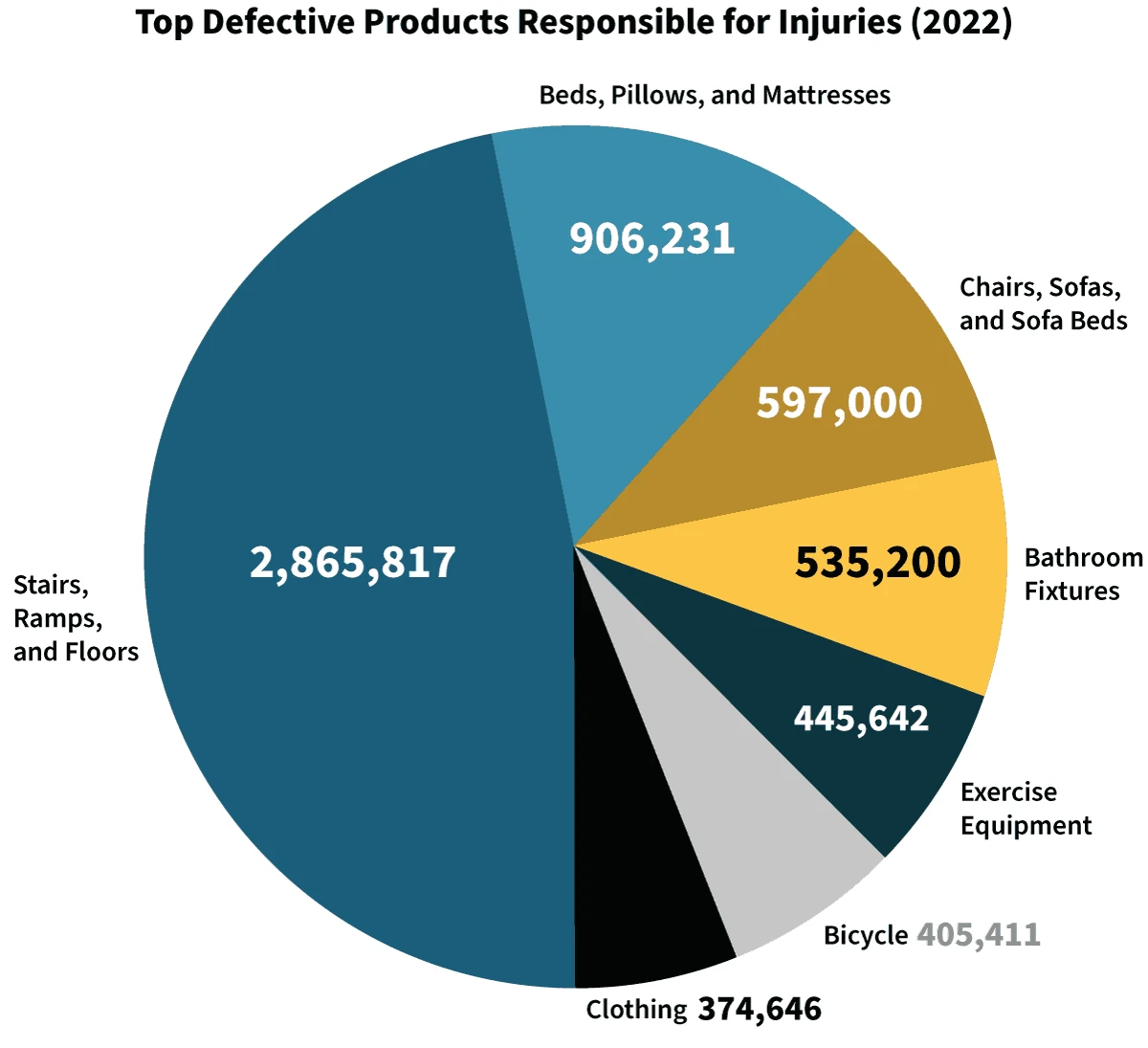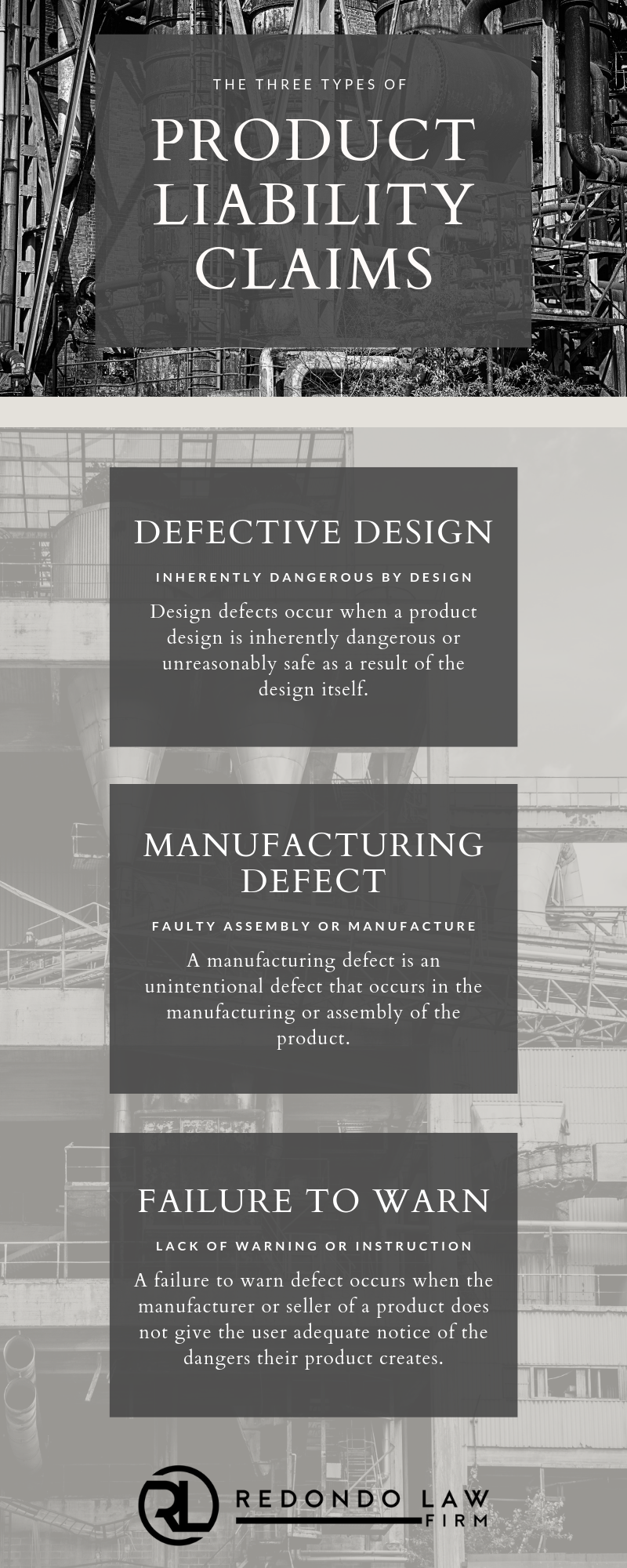If you’ve been injured by a defective product, you probably have many questions: Who is to blame for my injuries? Who will pay my medical bills? Will I be compensated for my pain and suffering?
Product liability claims can be more complex than other types of personal injury claims because they often involve multiple parties who are ultimately responsible for your injuries and losses. Seeking the help of a Miami product liability lawyer is an essential first step to holding those responsible for your injuries accountable.
Not sure if you have a valid product liability claim?
Miami personal injury attorney Mike Redondo is available to answer your questions, assess the validity of your claim, and help you pursue the justice you deserve.
Get started today by scheduling a free consultation.
How many people are injured by defective products?
Millions of people across the U.S. are injured by defective products every single year. In fact, according to the National Safety Council, more than 12.6 million Americans were treated in emergency rooms for injuries from defective products in 2022 alone.
Among the top products responsible for injuries were:
- Stairs, ramps, and floors (2,865,817 injuries)
- Beds, pillows, and mattresses (906,231 injuries)
- Chairs, sofas, and sofa beds (597,000 injuries)
In total, these 3 categories of products were responsible for almost 4.4 million injuries, a staggering 35%.
Other top defective products included:
- Bathroom fixtures (535,200 injuries)
- Exercise equipment (445,642 injuries)
- Bicycle (405,411 injuries)
- Clothing (374,646 injuries)

The most common acute injuries resulting from these types of defective products include broken bones, burns, head injuries, spinal cord injuries, internal injuries, and, in some cases, even wrongful death.
What is the basis for a product liability suit?
In product liability cases, there are basically 3 different types of product defects that can lead to a lawsuit.
Design defects
The first product defect commonly alleged in product liability lawsuits is called a “design defect.” Design defects occur when a product design is inherently dangerous or unreasonably safe as a result of the design itself. In these cases, the risks of using the product far outweigh the benefits.
Lawn darts, for example, were considered inherently dangerous and were judged to be defectively designed.
Manufacturing defects
A manufacturing defect is another common product defect alleged in product liability lawsuits. Unlike a design defect, which is unsafe from the start, a manufacturing defect is an unintentional defect that occurs in the manufacturing or assembly of the product.
For example, a kitchen appliance that overheats or catches fire due to substandard electrical wiring would be considered a manufacturing defect.
Failure to warn defects
Not all product defects deal with the design or manufacture of the product. In some cases, a failure to warn or provide adequate instructions may also provide the basis for a product liability lawsuit. A failure to warn defect occurs when the manufacturer or seller of a product does not give the user adequate notice of the dangers their product creates.
Power tools or ladders, for example, present risks to every person who uses them, but these risks can be minimized with proper use when there are appropriate warnings and instructions.

Who can file a product liability lawsuit in Miami?
Anyone who is hurt, injured, or suffers loss from a defective product has a product liability claim. It doesn’t matter who purchased the product or who owns the product.
For example, someone who borrows a defective product, uses a defective product, or is injured by someone else’s use of the product can pursue a product liability claim.
Panera Bread facing multiple wrongful death lawsuits for selling allegedly dangerous beverage
Panera Bread is facing a lawsuit after Dennis Brown, a 46-year-old man from Florida, died after consuming 3 of the chain’s Charged Lemonade drinks in October 2023, as reported by FOX59 News.
Brown’s family alleges that his cardiac arrest was caused by the beverage’s “unreasonably dangerous and defective design,” citing his pre-existing health conditions and lack of prior energy drink consumption.
The lawsuit accuses Panera of wrongful death, negligence, fraud, and misleading marketing of the Charged Lemonade as “safe, ‘clean,’ and ‘plant-based.'” The drink contains up to 390 milligrams of caffeine per 30-ounce serving, close to the FDA’s recommended daily limit.
Panera has denied the allegations, asserting the lawsuit lacks merit and insisting on the safety of their products. This follows a similar lawsuit filed by the family of Sarah Katz, a 21-year-old University of Pennsylvania student who also died after consuming the Charged Lemonade.
What is the standard of proof for product liability?
In most product liability cases, the standard of proof is a “preponderance of the evidence,” which means the plaintiff must prove that it’s more likely than not that the product was defective and caused their injury.
To do this, you’ll need to prove 4 basic elements:
- First, you must prove that you suffered an injury or some other kind of loss, such as property damage beyond the product itself.
- Second, you must prove that the product that caused your injuries was either defective or lacked proper instructions and/or warnings.
- You must also prove that the defect or lack of instructions/warnings was the specific cause of your injuries.
- Lastly, you must be able to prove that when you were injured, you were using the product as it was designed to be used.
The key is to establish a clear link between the defective product and your injury or loss. This means gathering evidence that shows how the product’s defect directly caused your harm and demonstrating that you were using the product as intended or as a reasonable person would.
Proper documentation, expert testimony, and medical records can strengthen your case, and having an experienced attorney to guide you through this process is often crucial for successfully proving your claim and securing the compensation you deserve.
Who is liable for damage caused by a defective product?
If you’ve been injured by a defective product, one of the most important things to consider when filing a product liability lawsuit is who might be liable for your injuries and losses. From the outset of your case, you will want to name all responsible parties as defendants in your claim for damages.
In product liability cases, determining who is responsible for your damages can be complex. There may be multiple parties who can be held liable for your injuries and losses, and naming the right defendants is critical to making a full financial recovery for your injuries.
In most product liability cases, you will want to include any parties in the defective product’s “chain of distribution.” The chain of distribution is the journey that a defective product takes from the manufacturer all the way to the customer’s hands.
Below are 3 parties that are commonly named as defendants in a product’s chain of distribution.
The manufacturer
In a defective product case, the first party that you name in your lawsuit may be the manufacturer, as they’re often the beginning of the chain of distribution for the defective product. If the defective product is just one part or component of a larger product, then you can name the manufacturer of the defective product as well as the manufacturer of the whole product that uses the defective part.
Additional parties who were involved in the manufacture of the product may also be named. For example, if your claim involves a design defect, you could name any design consultants that were used by the manufacturer. If your claim involves a failure to provide adequate instructions, you could also name any experts used by the manufacturer to write the instructions for the defective product as defendants.
The distributor/wholesaler
After a product leaves the manufacturer, there may be a number of middlemen who carry the defective product to the retailer. For example, there may be wholesalers, suppliers, distributors, and other parties that fall within the chain of distribution.
All of these middlemen may be liable for your defective product injuries and should be named as defendants in your product liability lawsuit.
The retailer
The retail store where the product was purchased may also be liable for selling the defective product that caused your injuries and losses. Although the retailer seems like an unlikely party to sue, remember that any party involved in the chain of distribution may be held responsible.
What types of compensation can I recover from a product liability lawsuit?
If you’ve been injured by a defective product, then you may be entitled to monetary damages for your injuries and other losses. Damages for product liability claims include both compensatory damages and, in certain circumstances, punitive damages, as we’ll outline below.
Compensatory damages
Compensatory damages are designed to compensate you for your injuries and financial losses, putting you back in the condition that you were in prior to your defective product injury.
These damages include economic damages, such as compensation for medical expenses, lost wages, and property damage, as well as non-economic damages, such as pain and suffering.
Punitive damages
If a judge or jury determines that the defendants named in the lawsuit acted with reckless disregard for the safety of others, you may also be entitled to punitive damages.
Punitive damages are designed to punish defendants for their conduct. These types of damages are also intended to deter other would-be defendants from engaging in similar conduct.
Unlike traditional damages, these are not directly related to your actual injuries and can oftentimes be much higher than the award for economic and non-economic damages.
Get help from an experienced Miami product liability attorney
If you’ve been injured by a defective product, the thought of filing a claim against a large company or corporation can feel overwhelming. But you don’t have to go through the process alone.
At Redondo Law, experienced Miami personal injury attorney Mike Redondo is ready to be the trusted advocate you deserve. With deep expertise in product liability claims, Mike understands how to build a strong case and secure maximum compensation for his clients.
Reach out to Redondo Law today to schedule a free consultation and to get the expert guidance and support you need to move forward with confidence.
References
Consumer Product Injuries. (n.d.). Injury Facts. https://injuryfacts.nsc.org/home-and-community/safety-topics/consumer-product-injuries/

